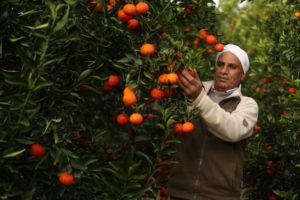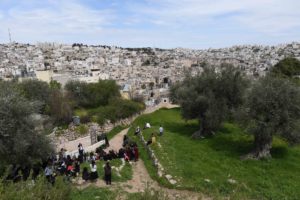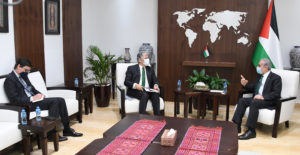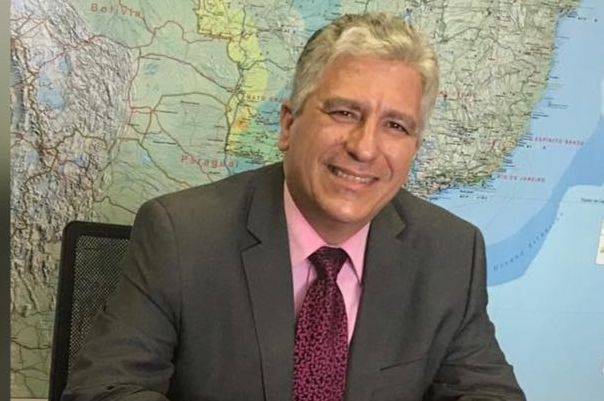São Paulo – If it’s up to ambassador Alessandro Candeas, Brazil-Palestine relations will grow and develop into new domains over the next months. The diplomat took office as head of the Brazilian Representative Office in Ramallah last December and since then has pursued a very busy schedule of talks to further the relations between Palestinians and Brazilians.
Candeas has a bilateral relation plan that goes beyond humanitarian relief. The diplomat aims for the countries to see each other as markets. An online event is scheduled for the second half of May for Palestinians and Brazilians to explore trade possibilities and do matchmaking, whose organization is being supported by the Arab Brazilian Chamber of Commerce (ABCC).
“Our trade is still quite modest,” Candeas told ANBA. Figures from the ABCC show that last year trade between Palestine and Brazil reached USD 27.5 million, comprising USD 26.7 million of Brazilian exports and only USD 780,000 in sales from Palestine. Brazilians shipped mostly meats to Palestine, while almost all Palestinians shipments consisted of fruits.

The diplomat says Palestine grow fruits and believes they could be potentially exported as processed goods to Brazil. “Brazilian companies could process fruits here and export them to Brazil,” he says. Candeas believes Palestine could also export clothing such as traditional Palestinian dresses and pieces to the Brazilian market. “They are very well done, an ancient technology, very colorful,” he says.
Trade with Palestine goes beyond the economic aspect, the ambassador says. “It creates jobs, generates income and promotes development,” he says, pointing out it’s key for local supply. Candeas adds that actions in Palestine have repercussions across the Middle East, North Africa and the Gulf due to the Palestinian political and humane stand and the high level of education, training, and business and family ties.
Find out more about Plestine:
- Palestine offers incentives to tech investments
- Project features authors from Lebanon, Tunisia & Palestine
- Palestinian makes custom embroidered patches in São Paulo
The Palestinian economy is driven by the small-scale subsistence production, which involves fruits, meats, dairy, oils and other items, as well as financial assistance from other countries and international organizations, and transfers of money by members of the diaspora community, Candeas said. There’s also income from tourism.

Palestine and Brazil already share a tourism relation, as many Brazilians visit the Holy Land. The ambassador believes this creates a very large potential for Brazilian and Palestinian tourism firms as well as small food producers and local artisans. Candeas stresses the low costs for Brazilians tourists in Palestine and the high-quality services.
But the new Brazilian representative to Palestine is taking steps to further develop other sectors beyond trade and tourism. He’s in talks to take the Brazilian Lectorship program to Palestine whereby a professor could teach Portuguese language and Brazilian culture in Palestinian universities. He’s also discussing a triangular cooperation so that Brazil can share its expertise in green education and energy with Palestine with funding from a German cooperation agency.
Candeas also wants Brazil to share its experiences in education with Palestinian refugee camps where the United Nations Relief and Works Agency for Palestine Refugees in the Near East (UNRWA) provides public services. “It’s a field where Brazil has much to offer,” he says. Another possibility is cooperation for human rights, and Brazil’s minister of Women, Family and Human Rights, Damares Alves, has already been involved and intends to act in person.
Portuguese language and soccer
Another initiative aims to retrieve the Brazilian roots of second-generation Brazilians who live in Palestine. Brazil is the home of many Palestinians, and some have come back to their family’s country of origin, particularly women who married Palestinians and had children, bringing to Palestine a new generation of Brazilians who don’t speak Portuguese. The Portuguese As a Heritage Language program will be taken in a cooperation work with the São Paulo State University (UNESP). Candeas says that there are already some Portuguese teaching initiatives at the embassy in Ramallah that will be incorporated into the project.
The diplomat also took on a mission in soccer. The plan is seizing the opportunity that next year’s FIFA World Cup will be in an Arab country, Qatar, and helping Palestine to compete in the 2024 Olympics. “Palestine loves Brazilian soccer, and my dream is that Brazil can help it make its soccer more professional,” he says. The sport is played by Palestinian men and women, and there are tournaments, but the idea is attracting a partnership from the Brazilian private sector to make it grow and become professional enough to be in the Olympics.
Visits

This world of possibilities for Brazil-Palestine cooperation has been discussed between the ambassador and Palestinian officials. Although he arrived in Ramallah in December, due to the social distancing measures ushered in by COVID-19, his credentials were only delivered to the minister of Foreign Affairs and Expatriates, Riad Malki, in late March.
Afterward, the diplomat met several ministers, who showed great interest in cooperation and sharing expertise. Candeas pointed out Brazil has a proven track record in cooperation. “There’s a great interest in Brazil. Brazil is a very beloved, sought after country, and people are pleased to work with Brazil,” says the ambassador.
Candeas was welcomed by prime minister Muhammad Shtayyeh, Higher Education minister Mahmoud Abu Mois, and Tourism and Antiques minister Rula Ma’ayah. He met with leaders of the Palestinian International Cooperation Agency and visited the Church of Nativity in Bethlehem with the chair of the Presidential Committee for the Restoration of the Church of the Nativity, minister Ziad Bandak, among other appointments of an ongoing schedule.
Alessandro Candeas
Before taking office in Ramallah, Pernambuco-born Candeas, who’s graduated in Law, was director of the Defense Department of Brazil’s Foreign Affairs Ministry. In the office, he came in contact with Arab countries, as he did when he worked with UNESCO in Paris and when he was an international advisor of Brazil’s Ministry of Education.
Translated by Guilherme Miranda




